This content is being reviewed in light of recent changes to federal guidance.
The “Other Hurston”- Broadening Communal and Digital Spaces
Part two of our three-part series recapping the events of The Project on the History of Black Writing’s NEH Summer Institute “Hurston on the Horizon: Past, Present, and Future”.
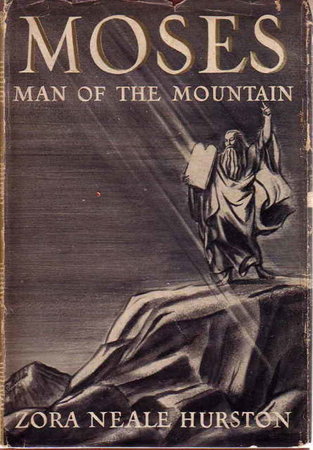 Week 2 of HBW’s NEH Summer Institute Hurston on the Horizon: Past, Present, and Future focused on different approaches to Hurston’s career by attending to her neglected texts, namely her ethnographies, journalism, and stage productions. Since the 1970s, critics have engaged with Hurston’s writing mostly through one genre (literature), one location (an undifferentiated South), and a certain set of themes (romance and language). Week 2 welcomed pre-recorded lectures or papers from a diverse selection of distinguished Hurston scholars, including Dr. Deborah Plant and Dr. Carla Kaplan. Additionally, Institute faculty Dr. Nicole Hodges Persley, director of the KC Melting Pot Theatre, and Dr. Lisa Pecot-Hébert, director of graduate journalism at USC Annenberg, brought their expertise to the Institute’s study of Hurston’s plays and series of articles for the Pittsburgh Courier. Drawing on this scholarly framing, NEH Summer Scholars addressed the effects of critics’ monolithic engagement by examining her unproduced plays Polk County and Cold Keener; less popular novels Moses, Man of the Mountain and Seraph on the Suwannee, recently published ethnography Barracoon, newspaper coverage of the Ruby McCollum case, and archived ethnographical audio material and film footage from the Library of Congress.
Week 2 of HBW’s NEH Summer Institute Hurston on the Horizon: Past, Present, and Future focused on different approaches to Hurston’s career by attending to her neglected texts, namely her ethnographies, journalism, and stage productions. Since the 1970s, critics have engaged with Hurston’s writing mostly through one genre (literature), one location (an undifferentiated South), and a certain set of themes (romance and language). Week 2 welcomed pre-recorded lectures or papers from a diverse selection of distinguished Hurston scholars, including Dr. Deborah Plant and Dr. Carla Kaplan. Additionally, Institute faculty Dr. Nicole Hodges Persley, director of the KC Melting Pot Theatre, and Dr. Lisa Pecot-Hébert, director of graduate journalism at USC Annenberg, brought their expertise to the Institute’s study of Hurston’s plays and series of articles for the Pittsburgh Courier. Drawing on this scholarly framing, NEH Summer Scholars addressed the effects of critics’ monolithic engagement by examining her unproduced plays Polk County and Cold Keener; less popular novels Moses, Man of the Mountain and Seraph on the Suwannee, recently published ethnography Barracoon, newspaper coverage of the Ruby McCollum case, and archived ethnographical audio material and film footage from the Library of Congress.
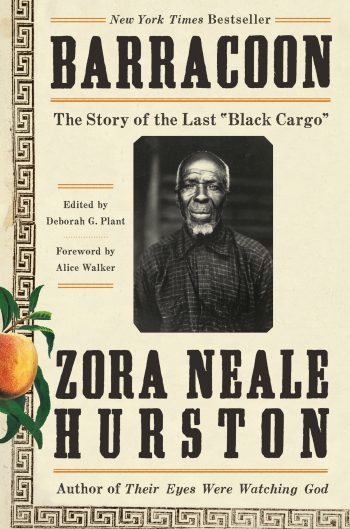 Combining their own specialized knowledge from a range of fields including Women, Gender, and Sexuality studies, Anthropology, Theatre and Performance studies, African and African Diaspora studies, Sociology, and Literary studies, NEH Summer Scholars’ diverse backgrounds illuminated the wide-ranging impact of Hurston as well as the expansiveness of her corpus. In the spirit of collaborative study, the Scholars were grouped together to lead discussions about research methodologies and their pedagogical implications with visiting faculty throughout the Institute. For example, Professors Amy Foley and LaToya Jefferson James discussed Dr. Deborah Plant’s lecture “Hurston, Innovation, and Ethnography.” Setting the tone for Scholars’ deep dive into the lesser studied aspects of Hurston, Dr. Plant notes in her presentation that “what we want to know about [Hurston], we’re not going to find out through her field notes—who she was as a social scientist precedes her academic training. There’s something about genius that you can’t explain.”
Combining their own specialized knowledge from a range of fields including Women, Gender, and Sexuality studies, Anthropology, Theatre and Performance studies, African and African Diaspora studies, Sociology, and Literary studies, NEH Summer Scholars’ diverse backgrounds illuminated the wide-ranging impact of Hurston as well as the expansiveness of her corpus. In the spirit of collaborative study, the Scholars were grouped together to lead discussions about research methodologies and their pedagogical implications with visiting faculty throughout the Institute. For example, Professors Amy Foley and LaToya Jefferson James discussed Dr. Deborah Plant’s lecture “Hurston, Innovation, and Ethnography.” Setting the tone for Scholars’ deep dive into the lesser studied aspects of Hurston, Dr. Plant notes in her presentation that “what we want to know about [Hurston], we’re not going to find out through her field notes—who she was as a social scientist precedes her academic training. There’s something about genius that you can’t explain.”
Dr. Plant’s second presentation of the week, “Teaching Ethnography,” also facilitated a rich discussion led by Professors Jalylah Burrell and Stephen Pasqualina. These Summer Scholars explored the Black feminist and womanist implications of Hurston’s research methods and ethnographic practices. Professor Paula White asked about Dr. Plant’s anthropological scholarship on Hurston and about the “key differences between womanist anthropologists and black feminist anthropologists in how they [framed] Hurston’s contributions to the field.” Dr. Plant explained how a part of her research has been to question what Black female anthropologists have been saying about Hurston in their scholarship. Hurston’s ethnographic studies make it possible to trace and analyze the interdisciplinary, literary, and historical foundations of Black feminist anthropology. During this conversation, Plant explained that most anthropologists writing about Hurston’s ethnographic work identified as Black feminists, not womanists. Dr. Plant reminded participants that “when we go back to the term [‘womanist’], and the creator of that term, Alice Walker, she’ll say ‘a womanist is a black feminist,’ [and] when we look at what womanism encapsulates in terms of Walker’s several noted definitions of it, we see it embraces exactly what black feminist anthropologists are doing; they’re taking that holistic, humanistic, revolutionary approach to anthropology.” Hurston’s ethnographic research about Black life serves as an opportunity for Black feminist anthropologists to trace their intellectual and anthropological histories.
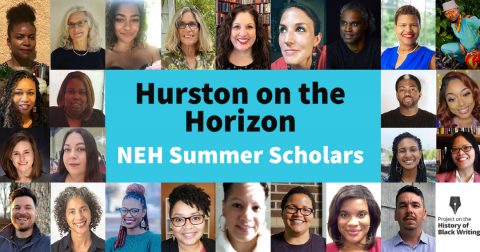 NEH Summer Scholars, which included tenured and untenured faculty as well as three graduate students, came from a range of universities and institutions across the U.S. such as the University of California (Irvine), University of Arkansas, University of Miami, and City University of New York to name a few. The twenty-five participants showed up virtually to each session excited to delve into intellectually enriching discussions about Hurston’s work and the Institute’s assigned readings, as well as their own discoveries about Hurston. Although the Institute was originally planned to take place at the University of Kansas in person, co-directors Ayesha Hardison and Maryemma Graham decided to shift the Institute online due to the ongoing COVID-19 restrictions. While a residential Institute would have allowed the Scholars to connect with each other in person while exploring university resources and the social scene of Lawrence, Kansas, convening virtually displayed the best of virtual collaboration and knowledge sharing in the digital space.
NEH Summer Scholars, which included tenured and untenured faculty as well as three graduate students, came from a range of universities and institutions across the U.S. such as the University of California (Irvine), University of Arkansas, University of Miami, and City University of New York to name a few. The twenty-five participants showed up virtually to each session excited to delve into intellectually enriching discussions about Hurston’s work and the Institute’s assigned readings, as well as their own discoveries about Hurston. Although the Institute was originally planned to take place at the University of Kansas in person, co-directors Ayesha Hardison and Maryemma Graham decided to shift the Institute online due to the ongoing COVID-19 restrictions. While a residential Institute would have allowed the Scholars to connect with each other in person while exploring university resources and the social scene of Lawrence, Kansas, convening virtually displayed the best of virtual collaboration and knowledge sharing in the digital space.
Scholars used the Zoom chat space to highlight and deepen critical points that enhanced the discussions by providing a wealth of adjacent sources that demonstrated Hurston’s intersectional impact. From pedagogical suggestions to literary criticism, Scholars used the chat space to mirror and expand the rigorous exchanges happening during the synchronous sessions, creating a multi-layered, resourceful approach that could only happen digitally. For instance, Professor Jerrica Jordan shared an online annotation of Phillis Wheatley’s most famous poem “On Being Brought from Africa to America” that includes images and explanations which help her students understand the importance of Wheatley’s poetry. Wheatley, taken from Senegal/Gambia, West Africa around age 7 and sold into slavery to a Boston family in the 18th century, was the first African American and one of the first women to write a book of poetry. Wheatley and Hurston unapologetically wrote about similar topics of race, Black consciousness, and religion. In addition to these two literary foremothers, NEH Summer Scholars made matrilineal literary connections between other Black women writers and Hurston, especially when sharing digital resources for pedagogical practice.
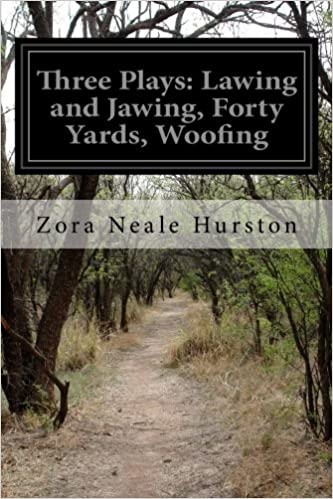 The Institute relied heavily on digital tools and resources while prioritizing accessibility and collaboration to help bridge the divide between traditional and newer technologies. During the end of the second week, Dr. Nicole Hodges Persley and performers from the KC Melting Pot Theatre (KCMPT) adapted a staged reading of Hurston’s sketches Poker! and Woofing on Zoom. KCMPT actors and actresses presented a lively performance, coupled with music and props, while the audience responded visually by using emojis on screen and commenting in the chat. After the reading, Dr. Hodges Persley, some of the actors, and Institute faculty engaged in a “talk back” exploring the major connections raised during the performance.
The Institute relied heavily on digital tools and resources while prioritizing accessibility and collaboration to help bridge the divide between traditional and newer technologies. During the end of the second week, Dr. Nicole Hodges Persley and performers from the KC Melting Pot Theatre (KCMPT) adapted a staged reading of Hurston’s sketches Poker! and Woofing on Zoom. KCMPT actors and actresses presented a lively performance, coupled with music and props, while the audience responded visually by using emojis on screen and commenting in the chat. After the reading, Dr. Hodges Persley, some of the actors, and Institute faculty engaged in a “talk back” exploring the major connections raised during the performance.
Apart from Zoom, Scholars collaborated and got to know each other by using other designated online spaces and platforms, including virtual discussion boards, happy hour events, and one-on-one meetings with Week 2 Institute faculty. For instance, one discussion board called “Hurston Show N’ Tell,” provided an opportunity for participants to post any personal interests, pictures, videos, or memorabilia about Hurston. Professor Johnny Jones posted a photo of his copy of Hurston and Langston Hughes’ play Mule Bone from the Lincoln Center Theatre 1991 production in New York City. Another Summer Scholar, Valerie Kelco, shared a few photos of Hurston’s singed papers, which were rescued from a house fire and later housed at the University of Florida Libraries in 1961. Not only were participants able to share their Hurston memorabilia, but the discussion board also provided a digital space for the Scholars to hold conversations through different comment threads about the items other participants shared. Scholars enjoyed these personal exchanges while also engaging the scholarship discussed during group sessions and faculty presentations.
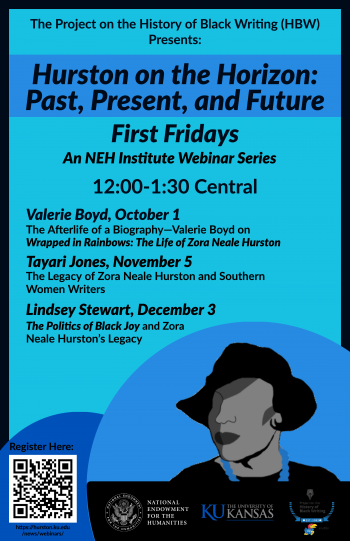 Looking forward to the final week of the Institute, NEH Summer Scholars expanded their engagement with intellectual community building by refining their group and individual projects, which had creative, scholarly, and pedagogical aims. Their works-in-progress served as an opportunity to advance the Hurston-related projects they discussed in their applications to the Institute or to begin conceptualizing new projects informed by their reading and discussions during the Institute.
Looking forward to the final week of the Institute, NEH Summer Scholars expanded their engagement with intellectual community building by refining their group and individual projects, which had creative, scholarly, and pedagogical aims. Their works-in-progress served as an opportunity to advance the Hurston-related projects they discussed in their applications to the Institute or to begin conceptualizing new projects informed by their reading and discussions during the Institute.
On November 5th, as the second installment of HBW’s post-Institute public webinar series, New York Times best-selling author, Tayari Jones, will lead the audience in a discussion about Hurston’s intellectual contributions and creative genius. Please register for the Hurston's intellectual discussion [link no longer active] to join us as we resume our exploration of Hurston’s life and legacy.